To ditch the carbs for good, you need to understand the advantages of a low-carb diet, how to start, what to eat and how to avoid the common mistakes.

Advantages Of A Low-Carb Diet is an article was written by Michael Joseph and reviewed by Raphi Sirtoli, MSc.
If you are new here, you may want to read the keto glossary to help you understand keto words, keto acronyms, and keto slang.
The advantages of a low-carb diet: Why you need to Ditch The Carbs

In truth, fat is essential for your health, carbohydrates are not. This article will explain how to start a low-carb diet, and what to eat and there is a sample meal plan at the end. But let’s begin by taking a look at a few of the main advantages of a low-carb diet.
Are you ready to create the ultimate 12-month blueprint for reaching your health & weight loss goals this coming year?

Our free on-demand video training will walk you through how to make 2024 THE year you set health goals…and keep them.
1. Advantages of a low-carb diet on blood sugar and insulin levels
Eating carbohydrates have the biggest impact on our blood sugar and insulin levels. Restricting carbohydrates in our diet has a direct result in lowering our sugar levels and insulin needs. High sugar levels play a part in almost all chronic diseases such as type 2 diabetes, dementia, cancer and cardiovascular disease.
By lowering carbohydrate intake, blood sugars are controlled and insulin levels are minimised. This is incredibly beneficial for those with diabetes (type one or two) and those with insulin resistance.
2. Advantages of a Low-Carb Diet For Hunger
Low-carb diets tend to improve signals of satiety (wanting to put the fork down) and satiation (wanting to delay the next meal).
Stable blood sugars and moderate levels of blood insulin may be partly responsible for these healthful changes.
In a comprehensive study analyzing food cravings and appetite, participants on a low-carb diet were directly compared to participants on a typical low-fat diet. The results showed that the low-carb group suffered much lower cravings and were a lot less bothered by hunger.
Due to the appetite normalizing effects of dietary fat, anyone who has adopted a low-carb diet will know this for themselves.
3. Advantages of a Low-Carb Diet For the Heart
Low-carb diets have a beneficial impact on a whole host of heart disease risk factors. Specifically, they reduce triglycerides (a major risk factor for cardiovascular disease) and increase the concentrations of HDL (known as the “good” cholesterol).
Additionally, they lead to reduced blood sugar, insulin, and often help remove the triggers of chronic inflammation in the body; all of these things can be damaging to the heart. As well as this, another big advantage is fat loss, since a higher fat mass and obesity increase cardiovascular risk.
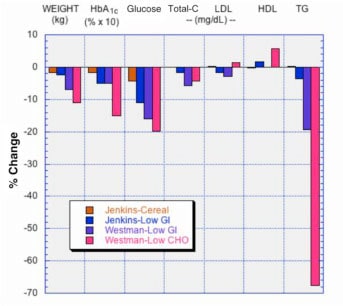
Here is a study documenting all these positive effects of an LCHF diet.
- Lower triglycerides
- Increased HDL levels
- Lowered glucose and insulin levels
- Increased weight loss
- Increased fat loss
- Reduced systemic inflammation
[convertkit form=2151210]
4. Advantages of a Low-Carb Diet For Weight Loss
To investigate the impact of a low-carb diet on weight, Harvard School of Public Health analyzed more than 53 different studies featuring more than 68,000 participants.
The results were not surprising: out of all the dietary fat-loss interventions, the individuals using low-carb interventions lost greater weight than participants on low-fat interventions.
Considering how the personal anecdotes and new studies are piling up by the day, it’s clear to see that the advantages a low-carb diet brings are worth pursuing.
Not only do you get to eat amazingly fresh, delicious foods every day, but you also vastly improve your health and decrease the risk of illness striking in the future.
For me, it’s a no-brainer, and I promise that if you get the hang of a low-carb diet, you won’t even want to go back to your prior way of eating.
Once you have a taste for real food, all the ultra-processed foods taste terrible.
How do I follow a low-carb diet?
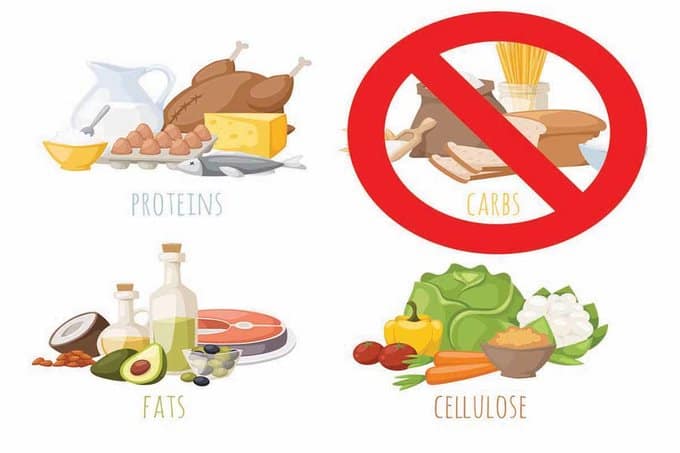
At its most basic, the low carb diet (or LCHF: low-carb high-fat) means eating plenty of healthy animal foods as well as nutrient-dense plant foods. We should encourage and emphasise the most nutritious types of these plant foods.
Look at spinach or an avocado; they are full of nutrients yet very low in digestible carbohydrates which turn to sugar in the body. By the same token, if we examine bread or rice then sure, they do have a few nutrients, but not so many.
Added to that, they also contain a significant amount of digestible carbohydrates which will make fat burning harder or stabilize unstable blood sugars.
Looking at the picture above, we can see that the three most nutrient-dense food groups are encouraged.
How Many Carbs Should I Eat On a Low-Carb Diet?
If you are just starting a low-carb diet, this can be confusing. In brief, one man’s low-carb diet is another man’s high-carb diet. By that, I just mean that there is no one-size-fits-all amount of carbohydrate you need to eat.
However, to get the best advantages of a low-carb diet, it’s better to aim at the lower end of the scale.
Some easy targets to follow are:
- Moderate low-carb – 100g net carbs or below each day
- Low-carb – 50g net carbs per day
- Keto – 20g net carbs per day, or less
[convertkit form=2151210]
Extremely Low-Carb Diet Plans
Typically, diets extremely low in carbohydrates contain 20g per day or less of carbs. This way of eating is otherwise known as a ketogenic diet. For most people, following an extremely low-carb diet is optional rather than necessary.
Some people enjoy the low-carb, high-fat (LCHF) lifestyle just for overall healthier eating and the benefits of body composition. For others, though, keeping the carbohydrates low is a more critical pursuit.
Low-Carb Diets and Type 2 Diabetes
Due to what many see as the failure of dietary guidelines to manage the rising tide of type 2 diabetes, many diabetics have been turning to the low-carb diet. This decision makes complete sense.
In a healthy person, insulin is released in a timely and measured way to coordinate the metabolic response keeping your cells fed and your blood sugars stable:
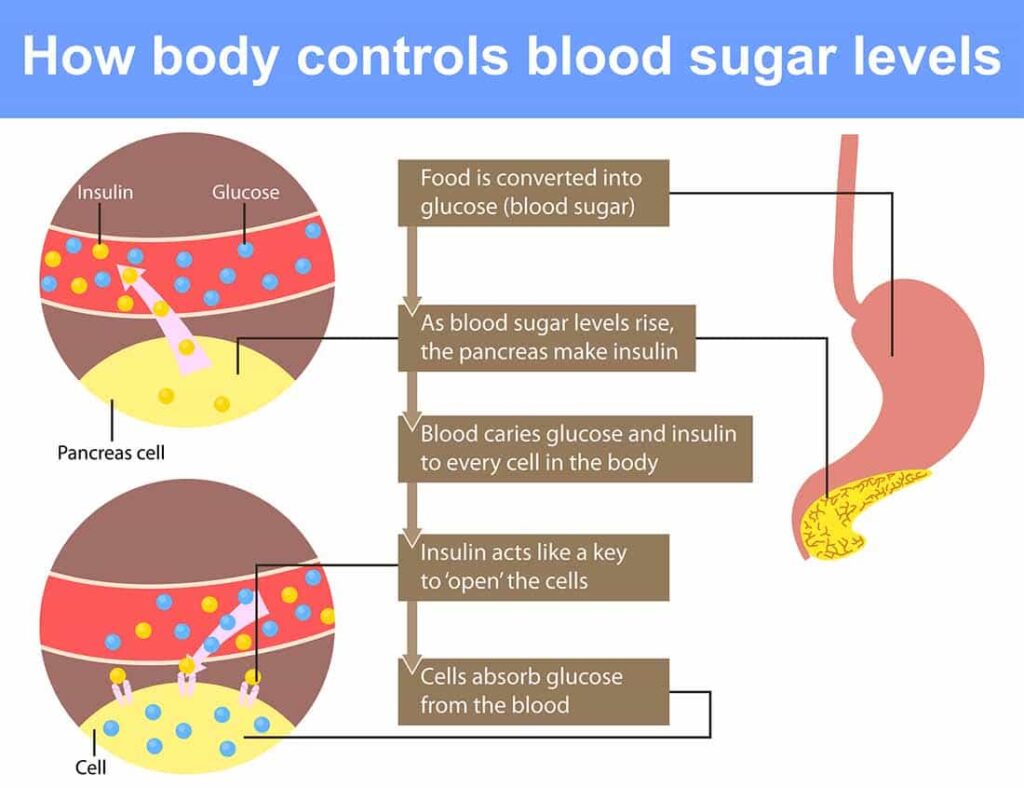
To make a complicated story simple; in Type two diabetics, the pancreas is now producing an inadequate amount of insulin which the body’s cells have become resistant to. The result is unchecked, rapidly rising blood sugar levels when eating foods that convert to glucose. Therefore, you could say that these people are intolerant to carbohydrates.
That brings us to the question: why would we feed a plate full of carbohydrate to someone with an intolerance to it? As well as this, protein and fat do not have a significant impact on blood sugar levels. As a result, ditching the carbs takes away the one dietary macronutrient that causes blood sugar spikes in diabetics.
While it’s generally accepted that there’s no cure for type 2 diabetes, a low-carb diet may permanently reverse the disease.
A Relaxed Low-Carb Diet
A carbohydrate intake of anywhere between 25g and 150g digestible carbs qualifies as a more relaxed low-carb diet. While 150g of carbohydrate is far from a small amount, it’s still a vast improvement to the standard carb-heavy diet most westernized nations follow.
Opting for a carb intake on the higher side of the scale may also be a choice for athletes who feel it helps their performance. However, elite sports performance is still definitely possible on lower amounts of carbs.
All things considered, the true advantages of a low-carb diet quickly become apparent on the lower side of the scale.
As a result of going very low carb, many people experience effortless weight loss, more energy (after the initial adaptation period), and an altogether healthier relationship with food.
Personally, I usually stick to somewhere between 50g and 80g per day. However, more than half of the total tends to come from fibrous plant foods such as avocado, nuts, dark chocolate and leafy greens.
Common Mistakes

It’s also worth remembering a typical mistake many people make when they ditch carbs. By this, I’m referring to the error of not replacing the reduced carbs with enough healthy sources of fat. As a result, people quite understandably feel terrible and struggle through the day with a lack of energy combined with food cravings. The result is getting stressed and ultimately giving up on their new diet before giving it a chance.
Hence low carb diets should emphasize larger amounts of fat, but the source of this dietary fat is critical as there are plenty of bad fats out there. A good rule of thumb is to stick to naturally-occurring fats from nature, rather than chemically processed ones created in a factory. As an example, organic grass-fed butter and margarine are poles apart regarding their respective health merits. And hopefully, you know that butter is the healthy one!
Another thing to (not) consider is the GI index of carbohydrates. Regarding this, you should be aware that the glycemic index of foods has no relation to low-carb eating. Although many people associate ‘high GI’ with bad and ‘low GI’ with good, all this means is that the body digests some carbs slower than others. No matter the speed, they are still all digested and contribute to the carbohydrate total.
Select the right amount of carbs for you and don’t be afraid of adding more healthy fat.
Which Low-Carb Foods Are Healthy?
Generally speaking, low-carb diets should include lots of fresh, single-ingredient foods. However, this isn’t always the case, and it is possible to ‘do’ a low-carb diet wrong.
In short; to experience the advantages of a low-carb diet you have to formulate your diet correctly. To sum up, the food choices you make will determine whether your low-carb diet is healthy or unhealthy.
Hence here is an infographic that I created to show an overview of the best foods to include:

This graphic provides a good overview of how a low-carb diet should look. Also, let’s take a look at the individual food groups in a bit more detail.
Protein-Based Foods to Eat on a Low-Carb Diet
Firstly, let me tell you that it’s a misconception that a low-carb diet is also a high-protein diet. In truth, there should be a moderate amount of protein, a high amount of fat, and a little amount of carbohydrate.
There are typically two types of protein: complete and incomplete.
Complete protein just means that the food contains all the essential amino acids; meat and dairy are great examples of this. An incomplete protein contains amino acids, but not the full range of them; typically plant-based proteins are incomplete.
For the purpose of this list, all sources are complete proteins.
Best Sources of Protein
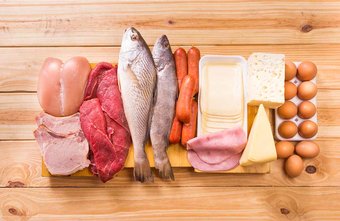
- Bacon
- Beef
- Beef Jerky
- Cheese
- Chicken
- Chorizo
- Cottage Cheese
- Duck
- Eggs
- Fish
- Greek Yoghurt
- Lamb
- Organ meats (heart, kidney, liver)
- Pepperoni
- Pork
- Prosciutto
- Salami
- Sausages
- Shellfish
- Turkey
- Whole milk
- Full-fat yoghurt
Due to the imagery of apples and oranges being the global poster child for healthy eating, you may not know this next point. All of these animal foods are extremely high in vitamins and minerals. Much more so than the fruits mentioned above. Despite this, many people still have concerns about eating meat, and how healthy (or not) it is.
Particularly relevant to this category is the status of red meat. All things considered, the truth is that it’s one of the most nutrient-dense foods in the human diet.
Fruits and Vegetables
Despite the ‘high fat’ part of LCHF diets, that doesn’t mean we shouldn’t eat lots of plant-based foods. Most noteworthy are leafy greens, as they are some of the most nutritious foods available and supply a wide variety of vitamins, minerals, and polyphenols.
Additionally, some of the lower-carb fruits are nice to include in an LCHF diet for two reasons:
They are full of beneficial polyphenol antioxidants & berries with cream are one of the best-tasting things on earth!
Sources of Fruit and Vegetable
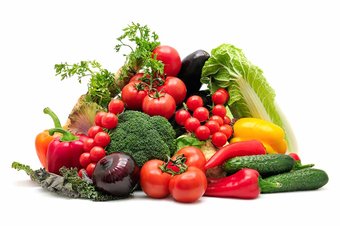
- Apple
- Artichoke
- Asparagus
- Avocado
- Beets
- Blackberry
- Blueberry
- Bok Choy
- Broccoli
- Cabbage
- Carrots
- Cauliflower
- Celery
- Cherries
- Coconut
- Cranberry
- Cucumber
- Eggplant
- Garlic
- Green/Spring Onion
- Kale
- Lettuce
- Lemon
- Mushrooms
- Onion
- Paprika
- Parsnips
- Peppers – All
- Pumpkin
- Radish
- Raspberry
- Sprouts
- Swede
- Turnips
- Strawberry
- Tomato
Vegetables
Some people unnecessarily worry about whether vegetables contain too many carbs. Due to the high fiber content, most of these vegetables have tiny amounts of digestible carbohydrates.
On balance, it’s also possible to fit the higher-carb root vegetables into a low-carb diet too (like sweet potatoes). However, be aware that these should be eaten moderately (depending on how low-carb you want to be).
Fruit
A quick note on fruit and the low-carb diet; some fruits can be extremely high in fructose, so they are best suited to an occasional treat. As an example, some of the high-sugar fruits include grapes, peaches, and most dried fruit. Lower sugar fruits tend to be much more nutrient-dense and are fine to eat on a daily basis.
Most noteworthy among these lower-sugar fruits are avocado, olives, and all kinds of berries.
Grains
Probably every time you hear a low-carb diet mentioned on TV, it’s always followed by some ‘expert’ giving ominous warnings. For the most part, these warnings tend to revolve around the idea of grains as an essential food group. How can we cut grains out? What about fiber? How can we live without grains?
I hear this a lot, so I made the image below to show just how non-essential grains are for fiber.
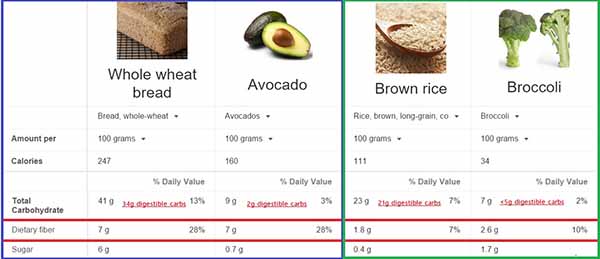
Not only are fruit and vegetables a lot more nutrient-dense than grains, but they are higher in fiber too.
Healthy Fats on a Low-Carb Diet
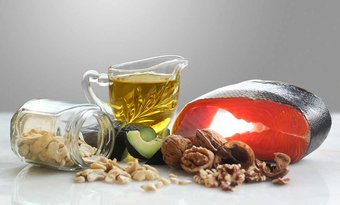
[convertkit form=2151210]
The fear of fat came from the lipid hypothesis of heart disease, with the myth of dietary cholesterol being a primary cause. Following this, the media scare-mongering lasted for decades and had people replacing butter with margarine, and low-fat processed products taking over supermarket aisles.
Thankfully, the truth about dietary fat has been emerging rapidly over the past decade. Most of all, several large-scale randomized controlled trials (RCT) have shown that diets high in fat and low in carbs have several significant benefits.
Especially noteworthy is the fact that low-carb diets result in greater weight loss and dramatically improve health markers for heart disease risk.
However, there is one group of fats that you should avoid. Despite carrying the (sponsored) tag of “heart-healthy”, it’s better to stay away from refined vegetable oils. While you may have heard that vegetable oils decrease LDL cholesterol (which is true), the fact that they significantly increase heart disease mortality shows just how little this means.
We should emphasize natural animal and plant fats. Here are some great options:
- Avocado
- Avocado oil
- Butter
- Coconut
- Coconut oil
- Duck Fat
- Ghee (my personal favorite!)
- Lard
- Macadamia oil
- Nuts – almonds, brazil nuts, macadamia (and all types)
- Olives
- Olive oil (extra virgin)
- Red palm oil (opt for a sustainably produced one)
- Seeds
- Tallow
Is Snacking Okay on a Low-Carb Diet?
Sure it is – if you want to. Obviously, excessive snacking will reduce the advantages of a low-carb diet that you see, but a little is okay. However, I recommend getting out of the mindset that a snack must come in a packet.
Real foods can be a great snack; here are a few snack ideas that can all be made (or opened) in less than a few minutes:
- A handful of nuts
- Boiled eggs
- Oily fish such as canned tuna/salmon
- A bowl of yogurt combined with blueberries and pieces of dark chocolate
- Mixed berries with heavy cream
- A few pieces of cheese with some olives
- Sliced and salted avocado
- A few pieces of dark chocolate
- Leftover meat from the night before
- All these ideas are simple to prepare, tasty, and healthy for you.
Anything Else?
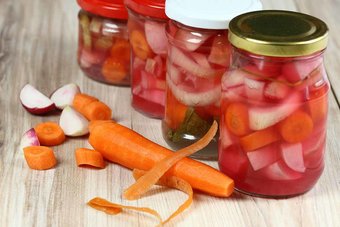
Additionally, what you drink is just as important as what you eat. Especially, I’d like to recommend you look into fermented foods.
As the health of our body depends on having a healthy gut and digestive system, supporting the good bacteria in our gut with probiotics is always a good idea. Some great-tasting fermented foods include kimchi and sauerkraut.
While there’s nothing wrong with the occasional glass of milk, latte, or tea with milk, it’s better to eat your calories rather than drink them. In other words; no soda, fruit juice, or sugary coffee drinks. Instead, opt for healthier options like water, tea, coffee, and herbal tea.
What Foods Should I Avoid on a Low-Carb Diet?
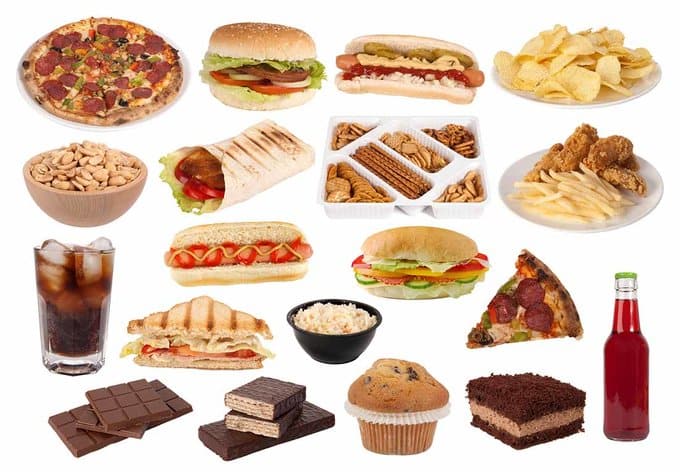
These foods are full of refined grain, sugar and vegetable oils. All in all, these ingredients are disease-promoting, and we should stay well away from them.
While some foods like potatoes and other starchy vegetables are obviously a lot healthier, on a low-carb diet it’s better to generally avoid them.
The avoid list:
- Bread
- Commercial ice cream
- Commercial pizza
- Cakes
- Candy (sweets)
- Cookies and biscuits
- Donuts
- Excessive high-sugar fruit
- Excessive starchy vegetables
- Fast food (take-out/takeaway)
- Fries (chips)
- Fruit juice
- Grains in general
- Ice-cream
- Low-fat dairy
- Margarine
- Pasta
- Pastries
- Potato chips (crisps)
- Processed meats like hot dogs and spam
- Rice
- Soda and other sugary drinks
- Sugar
- Sugary drinks
- Sweeteners like honey and coconut sugar
- Vegetable oils
Why?
Sugar, refined grains, and vegetable oils are the very worst foods we can eat – and they are found in most of the foods on this list. Also, if you eat packaged processed foods, it’s so easy to underestimate the amount of sugar you’re eating. The reason? It’s in almost everything.
Equally important, sugar is a very devious ingredient as it hides in food under many different names. Make yourself aware of the names that mean sugar.
Grains have a relatively low amount of nutrients compared to their digestible carbohydrate content. Additionally, they contain anti-nutrients that inhibit the optimal absorption of minerals. Many people who are new to low-carb diets wonder how they can eat with “such a restrictive diet plan”.
Fortunately, low-carb diets are not restrictive once you understand them, and there are so many delicious foods to eat. You can even make your favorite junk foods by using healthy ingredients!
Of course, some people like to see evidence that there are diverse food possibilities, so next, we’ll look at some meal options.
FREE 5-Day Keto Meal Plan
[convertkit form=2151210]
In order to give you an insight into the advantages of a low-carb diet, I’ve prepared a FREE 5-day meal plan and shopping list.
Or you can use the 1-week low-carb meal plan below, as a guide to what you could enjoy.
You can find every single recipe for these meals right here in the recipe section.
Monday
Breakfast – ‘Big Breakfast’ (bacon, egg, mushrooms, and vegetables.)
Lunch – Salmon Zoodles With Kale Pesto and Feta
Dinner – Big Fat Surprise and Roasted Vegetables
Tuesday
Breakfast – Chocolate Green Smoothie
Lunch – LCHF Caesar Salad
Dinner – LCHF Feta and Spinach Pie
Wednesday
Breakfast – Egg Wraps
Lunch – Spinach and Feta Parcels
Dinner – Easy Roast Lamb With Sugar-Free Mint Sauce
Thursday
Breakfast – LCHF Smoked Salmon and Scrambled Eggs
Lunch – Crustless Salmon Quiche With Beetroot and Walnut Salad
Dinner – Fish Curry With Coconut and Spinach
Friday
Breakfast – Boiled Eggs with Cheese Soldiers
Lunch – Greek Stuffed Mushrooms
Dinner – FatHead Pizza
Saturday
Breakfast – Meatloaf cupcakes
Lunch – Almond and herb-crusted schnitzel with vegetables
Dinner – Salmon and lime
Sunday
Breakfast – Coconut pancakes with berries and cream
Lunch – Lamb salad
Dinner – Lamb curry with spinach
Finally, if you need any further help, you are invited to join Ditch The Carbs PRO. Your 4-week course PLUS weekly lessons and challenges to make sure you never fall back into old habits.
Get our FREE guide to finally fix your metabolism!
Losing weight & getting healthy is never easy, but lately you might feel like it’s suddenly become impossible.
Our Flip the Switch guide will help you clearly understand what’s been going on, as well as exactly what you can do to get your metabolism working again so that you can look and feel your best—it’s easier and more simple than you think!


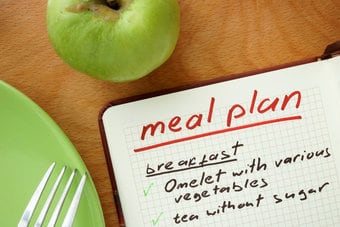







I’m interested in hearing your thoughts on LCHF while pregnant or breastfeeding? Unfortunately, I’ve found that sticking to LCHF tends to reduce my milk supply when nursing, especially since I can’t eat/drink the foods that normally give it a boost like oatmeal or beer. Advice?
I can’t give advice on this but I do know many pregnant women cruise through using LCHF, but with higher carb than they generally limited themselves to once breastfeeding. With anything, find out what works for you and go for it. I’m hoping some ladies here may be able to leave their experience with pregnancy/breastfeeding tips and LCHF.
1/4 cup oats soaked overnight with 1/4 cup almond milk and 1/4 cup unsweetened yogurt is good, oats are easy to digest and soaking releases the phytates lowering the effect of the carbs. Add fresh strawberries, and a wee sprinkle of sugar-free sweetener if you need it, or a pinch of salt is nice too! 1/4 cup oats is not going to raise your blood sugar, but gives you the nutrients you need as a nursing Mum.
Other things that are fantastic for milk supply are fenugreek capsules (start with 3 caps three times a day for about a week, then reduce to one, three times a day as your supply kicks in). Brewers yeast or nutritional yeast are extra helpful, as is coconut oil! My little bub gained lots of weight and my milk suply was great after doing these things. (My previous two children I had a lot of trouble with supply). Small portions (again, about a 1/4 cup serving to limit carbs) of quinoa once a day are also helpful when breastfeeding.
I am hypoglycemic, can I do this low carb diet? I need to eat 2-3 hours to maintain my sugar. I’ve been to nutritionist, have a diet planned out with set carbs and protein. But I haven’t lost anymore weight. This diet seems like a good one, I am afraid have a low sugar fit.
Actually your blood sugar will probably be more stable.
Tribal you need to count calories too even low carbing if you eat too many calories you’ll not lose weight as the body works on what energy goes in and gets burnt off
Google TDEE BMR then work out your macros
Say 30 grams carbs a day etc
A lot of diets programs often restrict your food alternatives however carb cycling does recommend some of general healthy eating guides as good as low carbs intake. The carb cycling meal plans diet compels the body to metabolize fat and protein to produce a matter as known as a ketone. So, the body burning fat for energy will generate Ketones
At 15-22 carbs per day it would seem my blood sugars would not be 200 in the morning gs or evenings. But alas it is. Any thoughts calories 900-1200
Blood sugars are often high in the morning (dawn phenomena). If you are only on 15-22 carbs per day I would check every label of everything you are eating to ensure carbs are not sneaking in somehow to still give you a reading of 200, or is your protein too high? Do you have insulin resistance? These are all factors which may be at play here. Healthy fats won’t raise BS at all.
I would check your glucose meter. Mine was reading high about 50 out of range.
When I had high morning blood glucose, it was rebound from a low at 2 am. Using a CGM, even on 3 day test, may reveal reason for high.
Janet, i had the same problem with AM BS. I did a 4 day fast then Keto eating. In 2 days my Fasting blood surgar was ranging from 85-100 & its staying normal. I was only taking Metformin
I feel tired most of the time, since doing no carbs. What foods are high fat that I should have? Thanks
Yay google is my queen assisted me to find this outstanding internet
site!
Allow me to affirm the benefits of LCHF DIETS as described in the article, with some suggestion and additions to it. Fats do clog arteries by the means of increasing the blood plasma aggregability, in other words it doesn’t increase the viscosity of blood but obstructs its rate of entrance within capillary vessels. But this is OK. not a problem, if it is continued for a reasonable period. However it is a big damaging clogging element, if the blood vessels are not giving sometime to heal. On the otherhand excessive carbs intake will finally be converted to visceral stored fat, and again this is absolutely OK, as long as this doesn’t continue fo ever, brcause it will start clogging body organs, like the liver, the pancreas, and the heart. However, if at a certain juncture, excessive carbs intake is disrupted, and a person alternates between LCHF & LFHC diets, this should periodically takes full advantage of each diet, and still give ample time to heal from its disadvantages… think about that. Nature usually forced all living beings to alternate between different categories of food depending on each season. And as a matter of fact, this is what body builders do. It’s called cyclic carbing….
I found this a fascinating read. As I have arthlersclorosis, info like this is very interesting indeed. I wonder if you would be kind enough to let me know where you came across these facts as I would like to know more.
Thank you!
Due to some recent lifestyle changes and family situations, I was beginning to slip back into old ways of meal prep (can someone say, “Comfort Food”?), so needed to refresh my motivation by re-reading this article. Thank you, Libby! Here’s my personal tip for keeping Keto meal prep really simple that works for me: I often do not have time or energy to devote to recipes for every meal, so I have BPC (Bullet-Proof Coffee, or Tea) for breakfast; then, for lunch, I’ll use leftovers from the previous evening’s dinner, utilizing all of the breakfast and lunch recipes in your 7-day plan for dinners instead, which triples my dinner options! 21 dinners! At times, there may be no leftovers for the next day’s lunch, in which case, I will usually have salad ingredients prepped and include low-carb/healthy fat options like avocado, nuts, olives, cheese, egg, fish, or meat.
I had no idea that low-carb diets increase satiety due to the balanced blood sugar levels they promote. I am trying to eat healthier to lose weight, and want to make sure I know exactly what I should and shouldn’t be eating. After learning about all of the benefits of eating a low-carb diet, I will definitely consider it.
Zero carb diets are good for over all health. This is my personal experience. I lost more weight within few days and also belly fat. Those who have more weight and belly fat must follow low carb diets. They will feel benefits within few days.
Great website; helped me prepare a dish for my diabetic father, but i disagree with your hate towards Corn. Stop dissing Corn, For gods sake.
You may choose to spend your carbs where you wish, for most of us, corn is too high in carbs to even contemplate eating it. HFCS high-fructose corn syrup is another example of why we avoid corn. Hope that helps 🙂
Low-carb diet suits most body types. Even if you are not doing Keto and just having a low carb diet to lose weight, you’ll get to see the results very soon. Low-carb and no-sugar diet is the key to losing weight very fast.
Yes you are absolutely right carbs really impact blood sugars, recently I have made the switch to low carbs diet and my blood sugar is really under control and that’s a huge plus point for me as I am diabetic. Also, my overall health has improved too. Thank you very much.
It’s a great article about the low carbs diet. Thanks for sharing this informative article 🙂
From the study it says that the supposed low fat group were encouraged to eat 30% of their calories from fat. Who’s definition of low fat are we using here because I’m afraid 30% fat from calories isn’t low fat.
How ironic that you allowed ads for Krispy Kremes! I daresay you don’t do that any more. I tried one once and it was rancid, so I’ve never eaten a donut since.
Thank you for all the great explanations about low carb living. I adopted it 4 years ago, cold turkey, and automatically say No Thanks to any offer of carbs. Needless to say the weight fell off and I’m still 15kg lighter than I was back then.
Your help was invaluable and I thank you for it.
Sue of Perth, Australia
Oh, Sue, you have made my day. I am honoured that I have helped you on your low-carb journey and low-carb diet. Congratulations on your incredible 15 kg weight loss, that is impressive. You have changed your health and your future. Well done. (and no, I don’t eat Krispy Kremes, in fact, I’ve never ever eaten one! As fast as I block junk food adverts, they appear again).